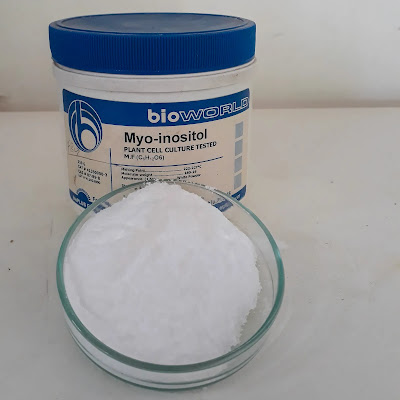Contents
hide
Product Identification
- Read – Ensuring Safety with Myo-Inositol SDS!
- Item Identifier: Myo-Inositol (Plant Cell Culture Tested).
- CAS No: 87-89-8.
Hazard Identification
- Eye: maybe little eye discomfort.
- Skin: this could result in minor skin irritation.
- Inhalation: Not anticipated to be dangerous.
- Ingestion: No harm is anticipated.
Precautions for Handling & Use
- In a well-ventilated environment, handle.
- Eliminate contact with the skin, eyes, & clothing.
- Wear the necessary personal safety gear (gloves, goggles, & lab coat).
- After handling, carefully wash your hands.
- Avoid being near heat, sparks, or an open flame.
- Store in a dry, cool area.
- Never consume or breathe in solution.
First Aid Measures
- Eye: For at least 15 minutes, flush with lots of water, and if necessary, seek medical help.
- Skin: Wash with soap & water, and if necessary, seek medical attention.
- Inhalation: Go outside and, if necessary, get some fresh air.
- Ingestion: Water down a lot, & if you need to, go to the doctor.
Fire Fight Measures
- Extinguishing Media: Is not flammable.
- Special hazards: Nil is known.
- Firefighters: Should put on the proper protective gear.
Accidental Release Measures
- Personal precautions: Wear the necessary personal safety gear.
- Environmental precautions: Avoid environmental release.
- Methods for cleaning up: Place the absorbent in an appropriate container after covering it with an inert substance.
Handling & Storage
- Handling: Utilize safe handling techniques & adhere to excellent industrial hygiene standards.
- Storage: Keep the container tightly sealed & keep it in a cold, dry location.
Exposure Controls & Personal Protection
- Eye protection: goggles or safety glasses with side shields.
- Skin protection: use Gloves.
- Respiratory protection: No requirement, under normal conditions.
- Ventilation: Use in a room with good ventilation.
Physical & Chemical Properties
- Appearance: White (powder).
- Odor: Odorless.
- Melting Point: Not applicable.
- Boiling Point: Not applicable.
- Flash Point: Not applicable.
- Vapor Pressure: Not applicable.
- Specific Gravity: Not available.
- Solubility: Soluble in ethanol & water.
Stability & Reactivity
- Stability: It’s Stable under normal conditions.
- Hazardous reactions: None knew.
- Conditions to avoid: None knew.
- Materials to avoid: Strong acids, strong bases & strong oxidizing agents.
- Hazardous decomposition products: None knew.
Toxicological Information
- Acute toxicity: This isn’t toxic.
- Skin irritation: Might cause mild skin irritation.
- Eye irritation: Might cause mild eye irritation.
- Respiratory/skin sensitization: Not available.
- Germ cell mutagenicity: Not available.
- Carcinogenicity: Not available.
- Reproductive toxicity: Not available.
- Specific target organ toxicity (single exposure): Not available.
- Specific target organ toxicity (repeated exposure): Not available.
- Aspiration hazard: Not available.
Ecological Information
- Ecotoxicity: Not available.
- Persistence & degradability: Not available.
- Bioaccumulative potential: Not available
- Mobility in soil: Not available.
- Results of PBT and vPvB assessment: Not available.
- Other adverse effects: Not available.
Disposal Considerations
- Waste disposal method: Follow all applicable federal, state, & local rules before disposing of.
Transport Information
- UN number: Not regulated.
- Proper shipping name: Not regulated.
- Hazard class: Not regulated.
- Packing group: Not regulated.
- Special provisions: Not regulated.
- Transport in bulk according to Annex II of MARPOL 73/78 and the IBC Code: Not applicable.
Regulatory Information
- OSHA Hazards: Not regarded as dangerous.
- SARA Title III: Not regulated.
- CERCLA: Not regulated.
- TSCA: TSCA Inventory-listed.
Other Information
This safety data sheet aims to give a concise overview of what we knew about the product as of the issue date. It does not serve as a warranty on the product’s qualities.
This data sheet’s content is based on our current understanding & is meant to offer broad observations about our goods & their applications. Therefore, it should not be interpreted as endorsing any particular feature of the product.

Conclusion
Myo-inositol (Plant Cell Culture Tested) is a white powder used as a nutrient additive for plant cell culture. Handle and store carefully, use good industrial hygiene and safety procedures, and follow correct disposal procedures with the proper personal protective equipment. It is on the TSCA inventory and is not hazardous according to OSHA regulations.
